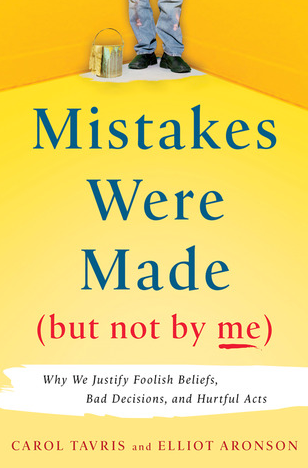Mistakes Were Made (But Not by Me) provides profound insights into the psychological processes that lead people to defend their actions and beliefs, often at the expense of truth and self-awareness.
By understanding these mechanisms, you can work towards greater personal accountability, improved relationships, and more rational decision-making.
The central theme of the book is cognitive dissonance, a psychological concept describing the discomfort felt when holding two conflicting thoughts or when behaviour contradicts beliefs.
The authors, Carol Tavris and Elliot Aronson, explain that to reduce this discomfort, individuals engage in self-justification, rationalizing their actions and decisions even in the face of evidence to the contrary.
To illustrate these concepts, they use real-life examples and psychological studies, demonstrating how people protect their self-image and avoid the painful admission of being wrong.
The Pyramid of Choice
The book introduces the metaphor of a pyramid to illustrate how small, seemingly insignificant decisions can lead individuals down vastly different paths. As people make choices, they justify them and become more committed to those choices, often leading to significant shifts in behaviour and beliefs over time.
Impacts on Personal and Professional Relationships
In personal relationships, cognitive dissonance can cause defensiveness and hinder the resolution of conflicts. Partners often justify their own behaviour while blaming the other, making it difficult to find common ground and repair the relationship.
Professionals, including doctors and therapists, may justify their actions and decisions even when they are wrong, potentially causing harm to those they are supposed to help.
How to Mitigate Self-Justification
The authors recommended a few strategies to mitigate the impact of self-justification:
Admitting Mistakes: One of the most effective ways to reduce self-justification is to cultivate the ability to admit mistakes and accept responsibility. This can lead to personal growth and healthier relationships.
Fostering Empathy: Understanding others’ perspectives and practicing empathy can help reduce the defensiveness that fuels self-justification.
Critical Self-Reflection: Regular self-reflection and awareness of one’s cognitive biases can help individuals recognize and address their own self-justifying behaviours.



